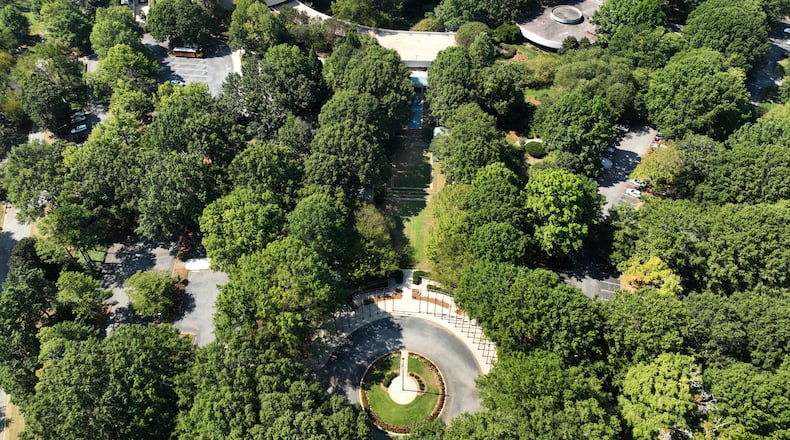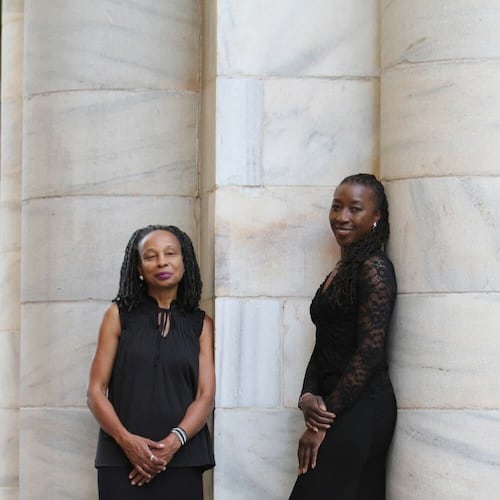The Carter Center and Jimmy Carter Presidential Library and Museum — collectively known as the Carter Presidential Center — have been a cornerstone of Atlanta’s history since their establishment in the 1980s.
Located in the Poncey-Highland neighborhood, just east of downtown, the center is easily accessible from the Downtown Connector.
While the Jimmy Carter Library and Museum joins the long-line of presidential libraries going back to Herbert Hoover and Franklin Roosevelt, the Carter Center next door is a unique expression of the Carters’ desire to continue working for peace, fighting disease and building hope.
Jimmy Carter Library and Museum
As part of the presidential libraries system, the Jimmy Carter Presidential Library is administered by the National Archives and Records Administration, a federal agency, and is the official repository of Carter’s presidential papers. As such, researchers can request an appointment to see the 39th president’s official papers, donated historical papers, White House staff stories and more. The library and museum also conduct student tours and offer educational opportunities for teachers.
The museum houses almost 70,000 square feet of space, including more than 15,000 square feet of exhibit space, and houses everything from gifts given to the Carters by world leaders to photos and videos from the their time as the nation’s first couple.
In addition to a walk-through cabin resembling the Camp David meeting rooms, there is a life-size replica of the Oval Office furnished exactly as it was during Carter’s administration. “The room was painted off-white in December 1974 at which time the salmon, gold, and green upholstery and drapery colors were selected,” according to the website.
Carter Center
The Carter Center is a not-for-profit organization founded by the Carters in 1982 to facilitate their post-presidential work “on a fundamental commitment to human rights and the alleviation of human suffering.” Although the Carter Center employs about 200 people at its Atlanta headquarters, there are thousands working around the world to encourage peace and fight disease.
According to the center’s website, it has monitored elections in 39 countries, as well as here at home. As the younger generation guides the center into the future, current leadership, through a statement calling for an end to excessive police force, has issued “a clear signal that the center, with its long international shadow, would be wading more deeply into domestic matters,” Ernie Suggs wrote on the center’s 40th anniversary.
The center focuses its health fight on six preventable diseases — Guinea worm, river blindness, trachoma, schistosomiasis, lymphatic filariasis and malaria in Hispaniola — “by using health education and simple, low-cost methods.”
“We believe access to health care is a human right, especially among poor people afflicted with disease who are forgotten, ignored, and often without hope. Just to know that someone cares about them not only can ease their physical pain but also remove an element of alienation and anger that can lead to hatred and violence,” the website quotes the former president as saying.
Mental health is also important to the Carters, with former first lady Rosalynn Carter leading the center’s mental health program.
Gardens
The Carter Presidential Center’s 35-acre park includes two lakes, a koi pond, sculptures and gardens. The Japanese Garden, designed by master gardener Kinsaku Nakane and donated by YKK Corp., contains azaleas and Japanese maples. There are two waterfalls in the garden — the larger of which represents the former president and the smaller of which represents his bride of nearly 77 years.
The center is also home to a special gift from a small village in Japan. The 200-year-old Peace Bell once sat in the center’s lobby but now is housed in a replica of its original tower. Visitors can strike the bell with a specially made cypress hammer.
The center’s gardens also play host to a popular neighborhood market, the Freedom Farmers Market at the Carter Center, every Saturday from 8:30-12:00 p.m.
LOCATION AND HOURS
Address: The Carter Center is at 453 John Lewis Freedom Parkway, with the library and museum next door at 441 John Lewis Freedom Parkway. Click here for directions.
Museum hours: Tuesday through Saturday, 10 a.m. to 4:45 p.m. Last admission is at 3:30 p.m. Research Library Hours by appointment only, Tuesday through Friday, 9:30 a.m. to 3:30 p.m.
Museum Admission: $12 for adults; $10 for seniors (ages 60+), active military with I.D. and college students; and free to children ages 16 and younger.
About the Author
The Latest
Featured


